Curated OER
Polygons
Second graders view a PowerPoint presentation on Identifying Polygons by their number of sides and their individual properties. They separate polygon tiles into groups by their attributes.
Curated OER
Polygons
Middle schoolers work together to create mobiles with different polygons. They research the polygon and list its characteristics. They may present to the class if they chose to.
Curated OER
Don't Box Me In
Learners explore the relationship between flat and three-dimensional shapes. They identify the names of 3-D shapes and construct cubes from squares.
Curated OER
Seeing Shapes
Learners study a variety of geometric shapes by taking pictures of items representing the shapes with a digital camera. They identify the shapes by using software to paint on the image.
Curated OER
How Much Grass Should I Buy?
Students examine a variety of real life situations in which they must access information, select an appropriate formula, and calculate an answer. A rectangular piece of grass provides an opportunity for the exploration of this lesson.
Curated OER
Tunnel Traps
Students identify shapes that match specific shape descriptions involving a range of geometric terms and correct polygon names. They utilize a mathematics educational software program to gain practice.
Curated OER
Area graphics for 7th graders
Students randomly select dimensions for three geometric shapes (square, right triangle and circle). From the graphs they compare and contrast the graphical results of each shape.
Curated OER
Around and Around We Go
Fourth graders discover that a polygon is a closed figure formed by line segments, and that the perimeter of a polygon is the sum of the lengths of its sides. They utilize a worksheet imbedded in this plan to gain lots of practice with...
Curated OER
What Does It Take?
First graders study the attributes of circles, squares, triangles and rectangles. They sort shapes that are the same and those that are different into groups.
Curated OER
Polygons
Fourth graders identify and describe lines, shapes, and solids using formal geometric language. They use Inspiration to create a graphic organizer and outline of polygons.
Curated OER
Tessel Your Way to Nagano!: Olympics, Winter Sports, Snowboarding, Graphic Design, Geometry, Math, M.C. Escher, Tessellations
Learners create Post-It note fundamental regions to tesselate. They make tesselations using computer software or websites. They create a jacket design with tesselation and determine the cost of production.
Curated OER
Elastic Band Shapes
Students identify basic shapes (triangle, square, rectangle, circle), create shapes with different body parts, and create shapes at various levels (high, low)
Curated OER
Geometry in Tessellations
Students examine tessellations and their geometric properties. Students also develop a better understanding of lines, planes, angles, and polygons.
Shodor Education Foundation
Shodor Interactivate: Lesson: Pythagorean Theorem
Use triangles and worksheets to guide the learning of triangles to the discovery of the Pythagorean Theorem.
Science Buddies
Science Buddies: Divide and Conquer: Proving Pick's Theorem for Lattice Polygons
If you like to play Tetris then you might like this project. You'll learn something interesting about the mathematics of complex shapes.
Beacon Learning Center
Beacon Learning Center: Anglemania!
Students explore four types of angles in this interactive web lesson.
University of Texas
Inside Mathematics: Don's Shapes [Pdf]
This task challenges a student to demonstrate understanding of the attributes of two-dimensional shapes.
PBS
Pbs Mathline: Mirror, Mirror Lesson Plan [Pdf]
Determine which regular polygons tessellate by using mirrors. Printable lesson.
Other
Virtual Polyhedra: Polyhedra Names
An extensive look at the naming of various polyhedral shapes. Many hyperlinks for more information.
PBS
Pbs Mathline: Looking Through the Algebraic Lens Grades 3 5 [Pdf]
Young scholars will explore odd and even numbers as well as triangles hidden in polygons through this lesson. Printable lesson.
Cut the Knot
Cut the Knot!: Polygons: Formality and Intuition
This is a very interesting site about polygons. The site begins by distinguishing between shapes whose sides intersect and polygons whose sides do not overlap. After this short introduction, you will find information regarding area and...
McGraw Hill
Glencoe: Self Check Quizzes 2 Polygons and Tessellations
Use Glencoe's Math Course 2 randomly generated self-checking quiz to test your knowledge of polygons and tessellations. Each question has a "Hint" link to help. Choose the correct answer for each problem. At the bottom of the page click...



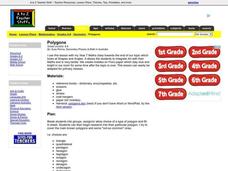
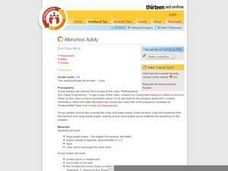

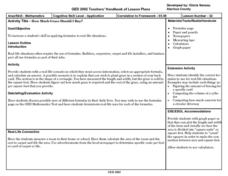


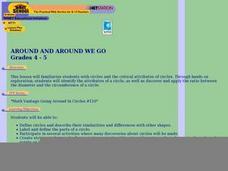










![Inside Mathematics: Don's Shapes [Pdf] Lesson Plan Inside Mathematics: Don's Shapes [Pdf] Lesson Plan](https://d15y2dacu3jp90.cloudfront.net/images/attachment_defaults/resource/large/FPO-knovation.png)
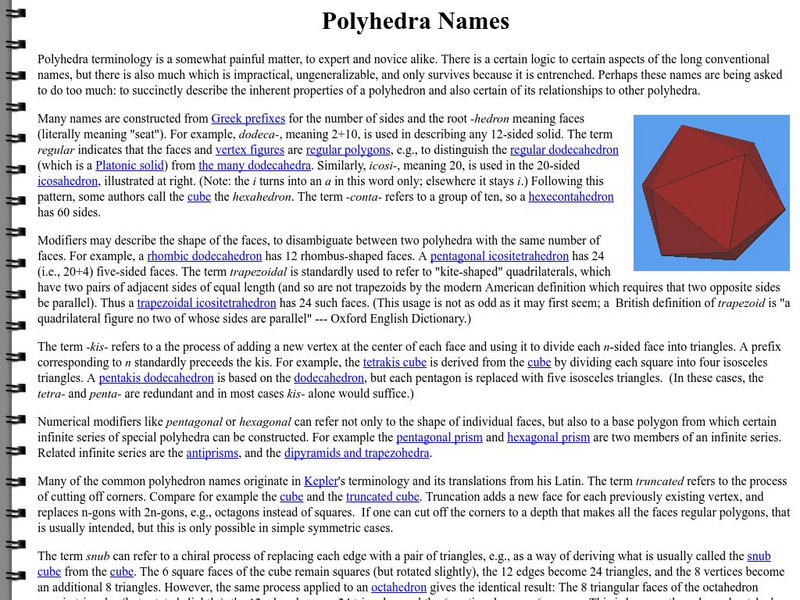
![Pbs Mathline: Looking Through the Algebraic Lens Grades 3 5 [Pdf] Lesson Plan Pbs Mathline: Looking Through the Algebraic Lens Grades 3 5 [Pdf] Lesson Plan](https://content.lessonplanet.com/knovation/original/114250-279cc412f7a28abe284211b4e1847c6e.jpg?1661771101)
